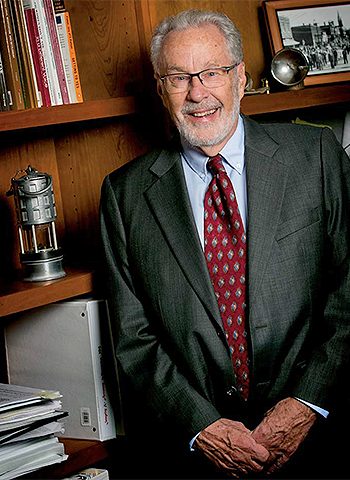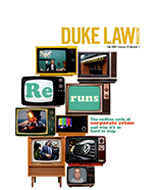Neil Vidmar: A social scientist leaves ‘an invaluable legacy’ at Duke Law
 Professor Neil Vidmar keeps mementoes from his coal-mining background, like the miner’s lamp, at left, in his office.
Professor Neil Vidmar keeps mementoes from his coal-mining background, like the miner’s lamp, at left, in his office.
Asked what's driven his success over almost 50 years as a scholar, teacher, and empirical researcher at the intersection of social psychology and law, Neil Vidmar answers quickly.
“Academics have a great privilege to follow their curiosity,” says Vidmar, the Russell M. Robinson II Professor of Law and Professor of Psychology.
A social psychologist by training who serves as research director for the Duke Law Center for Criminal Justice and Professional Responsibility, Vidmar is a leading expert on jury behavior and outcomes and has extensively studied medical malpractice litigation, punitive damages, dispute resolution, and the social psychology of retribution and revenge.
His recent projects have focused on such issues as pro se litigants, legal malpractice, the process of decision-making within the criminal justice system, and racial bias in capital jury selection.
After more than a quarter-century at Duke Law, Vidmar will take emeritus status at the end of the year. He says joining the faculty in 1989 opened myriad avenues for novel empirical study, often across disciplines and in collaboration with colleagues and students. “I had such great students,” he says. “Sometimes they’d come to me with questions and I’d say, ‘Why don’t we do a study on that?’”
Crossing disciplines
The son of an Illinois coal miner, Vidmar worked three summers in the mines during college and still proudly displays his miner’s certificate and lamp in his office. He describes his undergraduate years at McMurray College, where he got hooked on social science, as “life-changing” in exposing him to a more diverse world than he had previously known. Vidmar went on to graduate from the University of Illinois in 1967 with a PhD in social psychology and a secondary specialty in experimental psychology; he then landed a tenure-track position at the University of Western Ontario (now Western University) in London, Canada, where his early research focused on conflict and group decision-making in areas unrelated to law. The legal connection happened by chance, when he accompanied a colleague to the 1970 trial, in Toledo, Ohio, of a Black Panther member accused of killing a police officer.
“I had never been to a trial, or even in a courtroom,” says Vidmar. Hearing about Vidmar’s work on the so-called “polarization shift,” a phenomenon whereby a group tends to make decisions that are more extreme than the individual inclinations of its members, the defense attorney added him to the witness list. “I just talked about the fact that when you have a group of people who have attitudes in one direction, they tend to shift towards the extreme ends,” Vidmar says. “I don’t think my testimony lasted more than half an hour. But I was instantly hooked.”
Back in London, Vidmar headed to the courthouse “every spare moment I had,” to observe trials. He began to interview parties to lawsuits in small claims court at each stage of the litigation process — after the pleadings were filed, during the process of mandatory mediation, during trial, if the case failed to settle, and afterwards — delving into their motives and perceptions about their cases and the legal process. That early work on litigant behavior led Vidmar to craft a well-received research agenda that extended to such matters as alternative methods of dispute resolution, the use of expert witnesses in court, how juries process discredited eyewitness testimony, and how jurors are selected. He also became affiliated with Western’s law school and involved in Canadian jury-reform efforts. Vidmar published the first of his four books on juries, Judging the Jury (Plenum Press), co-authored with Valerie P. Hans, in 1986.
Innovating in the classroom
After visiting Duke as a professor of law and social science for two years, Vidmar joined the governing faculty in 1989 and in 1994 was appointed as the Russell M. Robinson II Professor of Law. Vidmar, who also held a secondary appointment in Duke’s Department of Psychology, was the first non-lawyer on the Duke Law faculty and one of the first at any U.S. law school. It isn’t surprising, then, that he developed one of the first courses to be offered on a law school curriculum about the use of social science evidence and the law.
“When I enrolled in Professor Vidmar’s Social Science Evidence & the Law course in the 1980s, it was a bit of a gamble,” said Clinical Professor and Wrongful Convictions Clinic Co-director Theresa Newman ’88, who has worked extensively with Vidmar in the years since. “He was a visiting faculty member at the time, so no students knew him, and there were no other courses with ‘social science’ in the title. But it turned out to be a great course, and one that continues to inform me in the work I do in the Wrongful Convictions Clinic. Maybe more important than the substance of the course was Neil’s unbounded enthusiasm for the intersection of law and psychology. Even today, that enthusiasm leads to new avenues to explore together. I cherish his mentorship and friendship.”
The course in negotiation was another law school novelty when Vidmar developed it in 1990, yet it quickly became one of the most popular on the curriculum. With four small sections of 24 students apiece offered each semester to meet constant demand, approximately two-thirds of every Duke Law class now takes Negotiation prior to graduating.
“It took off right from the start,” Vidmar says. “Much of what lawyers do is based in negotiation, whether they are criminal or civil lawyers, or whether they are trying to develop contracts.”
In the simulation-based course, students are assigned roles and negotiate against each other to reach a settlement in legal scenarios that gain complexity as the semester progresses.
“It is not unusual for students to comment that the course is one of the most valuable they have taken in law school,” says Clinical Professor Diane Dimond, who started teaching Negotiation with Vidmar when she joined the faculty in 1994 and is now one of several Duke Law teachers who follow his model. “They note that the skills they have learned help them not only in their legal practice, but in their personal interactions as well.
“While Neil cannot be replaced, in this course alone he leaves an invaluable legacy to the school and its students,” Dimond says.
A collaborative empirical researcher
Empirical research across a broad spectrum of topics in civil and criminal law has been a hallmark of Vidmar’s scholarly agenda, which has continually included jury behavior and litigation outcomes. He led a groundbreaking four-year study of jury deliberations in Arizona that involved extensive interviews with jurors and cemented his faith the system. “That project helped me realize how seriously jurors take their task,” he says, noting their willingness and tendency to become well-educated on the issues, thorough in their review of evidence, and insightful in questions to judges presiding over trials. Two decades of studying the way juries handle medical malpractice cases found jurors siding with doctors in three out of four cases that go to trial, leading him to conclude that juries “are anything but irresponsible,” as tort reform advocates claim. He has shared that finding with lawmakers in Capitol Hill testimony related to reform efforts.
In American Juries: The Verdict (Prometheus Books, 2008), Vidmar laid out, for a general audience, how the U.S. jury system evolved, how juries operate, and how they reach verdicts and make awards. He again co-wrote the book with longtime colleague Hans, a professor at Cornell University Law School.
Also a renowned jury expert, Hans recalls meeting Vidmar in the late 1970s when they were both involved in jury reform efforts in Canada as psychologists “with a passion for law.” He introduced her to the new Law and Society Association, which brought together scholars from multiple disciplines who studied law and legal institutions (and which she now heads as president), and invited her to co-author first a book chapter and then Judging the Jury with him.
“It was a wonderful experience for me to work with someone who was so gifted as a writer and thinker,” she says. “I learned a great deal from him — and have continued to learn from him to this day.”
In recent years, Vidmar has developed a range of projects pertaining to criminal law, working closely with James Coleman, the John S. Bradway Professor of the Practice of Law and director of the Duke Center for Criminal Justice and Professional Responsibility, and Newman, the center’s associate director. In addition to collaborating with them on articles and amicus briefs on the questionable reliability of eyewitness identification and the problem of racial bias in selecting death-qualified jurors, Vidmar has helped them address broader questions of decision-making in criminal law. He started by connecting them with his colleagues at the Duke Institute for Brain Sciences.
“We realized the synergy between what they were doing, in terms of pure research, and what we were doing in trying to improve the criminal justice system and to find some way to use science,” Coleman says. “We thought if there is some way we can use science to convince prosecutors and judges and jurors that there was a better way to do things than how we had traditionally done them, then that would be a really important contribution.”
Vidmar “jumped into it completely,” Coleman says, helping convene conferences with scientists, prosecutors, and law enforcement officials to examine how decisions are made in the criminal justice system. “I think he’s loved the opportunity to work in his discipline on different problems, and he’s helped us think about these issues in a way that goes beyond just criminal law.”
Infectious enthusiasm
Vidmar’s enthusiastic embrace of new research projects and his ongoing endeavors has left an indelible impression on his many colleagues.
“Neil takes such great joy in his work,” says Hans. “He never seems happier than when he has a new project to develop.” Dimond also admires the unflagging energy and commitment to excellence he’s brought to their longtime teaching partnership: “Working with Neil over the years to develop and keep the Negotiation course fresh has been a privilege. As a colleague, he is generous with his time and talents. He focuses on student needs, interests, and outcomes. He is smart, kind, easy to work with, and wickedly funny.”
Mong-hwa Chin LLM ’11, SJD ’14 , who has been Vidmar’s student, SJD advisee, research collaborator, and co-author, says Vidmar’s upbeat personality, patience, and positive attitude towards work make him a great teacher and supervisor.
“When he accepted me as his student, I really knew nothing about social psychology and decision-making,” says Chin, now an assistant professor at National Chiao Tung University School of Law in Taiwan. “When I first met him, in order to let me feel more comfortable, he emphasized more than once that he is a law professor who does not have a law degree. Over the years, he guided me through the fundamentals of this field and introduced me to the idea of ‘irrational decision-making,’ which became the core concept of my dissertation.” Chin and Vidmar jointly presented research on the jury system to Taiwanese jurists and international scholars in 2014, as Taiwan considered allowing laypersons to hear trial evidence along with judges in its traditionally inquisitorial trial system.
“Neil is such an easygoing and accessible person,” says Chin. “He was always eager to share his experiences and the exciting findings that he recently learned from a paper. When you talk with him, you can feel his devotion in his field and his role as a teacher.”
